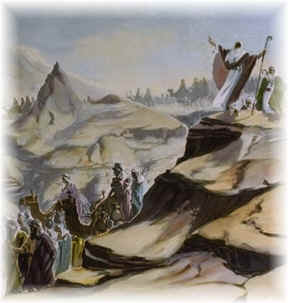Behind him, a whistle seared the air, and a smacking sound was followed by a man’s sharp howl of pain. “Work, slave!†cried the overseer. The whip sang out again, its song savage and filled with a perverse joy, landing on the slave’s back. Lashes crisscrossed his back, blood slowly dripping down to color the dull sand. With a shock, Moses recognized the slave he had argued with only minutes earlier! The whip rang out again, and the slave’s knees buckled. He sank to the ground, his head bowed in resignation and pain. As he fell, his eyes met Moses’. The Hebrew read humiliation, pain, and, more than anything, a sense of pleading in them. As if the slave had somehow gotten into his head, he heard a voice inside say, Help me, Moses!
Moses stared at his fellow slave. His own back began to burn, then sting. The overseer turned to him and smirked at the sight of the ex-prince in pain. “What is it, Your Highness?†he said mockingly. “Is the little prince tired of working already?†The pain in Moses grew to internal inferno. It burned, stoked by a divine bellows, and Moses shrieked in pain and rage. With a hiss, he drew the dagger he kept in his kilt and bore down on the overseer. The overseer’s expression changed from one of smug satisfaction to one of shock. As he put up his hands to defend himself, Moses’ dagger struck at the man. It dove like a pelican into the overseer’s black heart, blood spurting out like a fountain. The overseer gasped, then stepped back, clutching his chest. He fell, his head twisted around, onto the sand.
The slave turned, his back leering at Moses. He gaped at the young Hebrew, then shouted in pure, unadulterated anger at the youth who still stood in shock, his dagger dripping blood. “You idiot! What have you done? We’ll all be punished by Pharaoh because of you!†As he continued to rant at Moses, the Hebrew regained his senses. He dropped his dagger into the sand and began to carefully pour sand over the dead man. The slave stopped his oration for a moment. “What are you doing?†he croaked in astonishment.
Shaking his kilt free of sand, Moses gained a bit of composure. “What does it look like, my friend? I’m burying him. At least, they won’t find him for a little while.†He shoved the body under the sand a final time and patted the sand under which the body lay. Getting to his feet, he asked, “Are you all right?â€
“As good as I can be, I suppose,†the slave replied, also getting to his feet. “Why will you do now? Pharaoh’s soldiers will be after you, Moses.â€
“I know,†the young Hebrew shrugged. “I’ll leave, I suppose. Egypt holds too many memories for me now. I’ll be back eventually, I hope.â€
The slave gulped. “Thanks, by the way,†he ventured timidly. “I was a bit angry.â€
“No problem,†Moses replied smoothly. “Take care of those lashes, my friend. I’ve got to be off.â€
“Just like that?†the slave asked incredulously.
A grin crossed Moses’ face. “Just like that,†he whispered, holding a finger to his lips. “I’ll be back, never fear.†With that, the young Egyptian-turned-Hebrew began to thread his way through the workers to where the Great Road led out of Thebes. The slave shook his head at the folly of youth and continued his neverending work.

